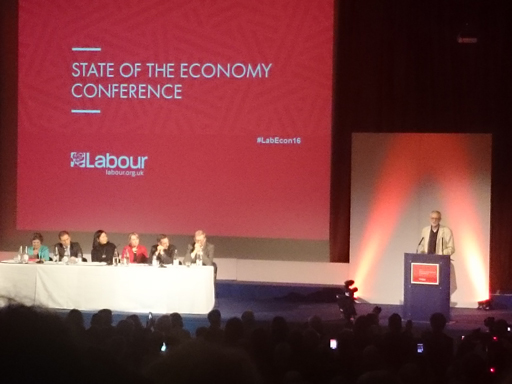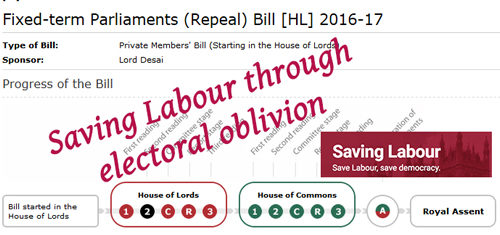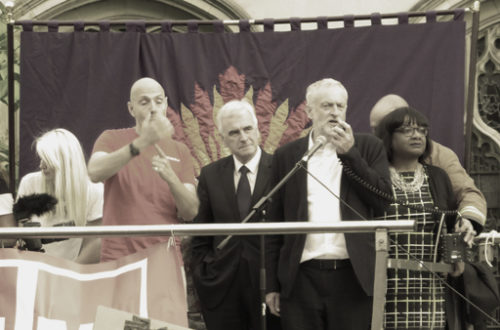The State of the Economy Conference

Today I spent the day experiencing something I never thought I’d see, some of the great and the good from the Labour Party getting down with the plebs. Yes, the audience contained some of that glorious mix of people that you never see outside of party events, including some new elements of crazy from the peanut gallery that made me laugh plus all the normal interest groups that makes Labour such a cauldron of sometimes bonkers ideas but there were normal people there too. You know, the kind of people who don’t usually turn up to these kinds of things.
The day itself was remarkable and so typical in many ways, from it being open to the great unwashed to the “workshops” which weren’t – well, certainly they bear no relationship to real workshops I’ve been to where people contribute and there are outcomes, rather than just have a few speakers and then a few Q&As… but hey ho, so what if it was more of a presenting of ideas that may influence final policy than a consultation. It’s still better than nothing.
The most interesting thing about the day was not hearing anything new (apart from a tax on bank accounts that apparently Brazil had, it was the same old, same old) I learnt something quite profound. That I really do believe the transformative ability of politics. Living in the land of the post war settlement of 1945, you’d think it’s second nature but we forget just how big a deal that was. Even Winston Churchill was involved in setting up the welfare state, even though this now seems to be conveniently ignored by those who wish to dismantle it.
Today, I nodded along with most of the speakers I heard in the workshops but one made my blood run cold. The speaker appeared to believe that those the lower end of the self employed income brackets were doing it by choice. How the decision to agree to no employment security and to absorb costs that should be borne by their employer is considered to be a decision made freely is beyond me. The economic duress of not being able to pay your bills vs accepting what can turn out to be less than minimum wage once the costs of agreeing to provide your labour, with no guarantees that there will be even a minimum amount of hours to ensure you cover your bills and with no possibility of negotiation, is a Hobson’s Choice and needs to be resisted at all costs.
As I was listening to her I realised that I didn’t trust the Labour Party to not see it the speaker’s way. After all, when in government, they allowed those pernicious zero hours contracts to make inroads, they continued to weaken the unions and generally left workers to fend for themselves whilst providing corporate welfare in the guise of working tax credits to enable businesses to pay less than appropriate wages because they knew the state would provide for their workers. I’m all for small businesses but they should go out of business if their income is so marginal that denying their workers a living wage by refusing them of a couple of pounds an hour extra and therefore robbing them of their dignity by making them claim state benefits to keep them afloat is just one effrontery too far… and don’t get me going on those work for the dole schemes that meant large companies could get free labour that was provided by the DWP through nothing less than threats to the state paid replacement income of the jobless.
How did we ever get to a situation where the public service had a higher wage than the private sector for the same jobs? The public sector pay rates have always been poor compared to the private sector but the trade-off for the low wage has always been the benefits of a decent pension and job security.
How did we end up in a situation where those who provide social housing, are companies named in the panama papers?
How can I pay more tax than Amazon? Particularly since this isn’t a new thing, NewsCorp went for at least 11 years from 1988 without making an overall contribution to the UK’s tax coffers.
What I realised as I listened to that speaker is that not only did I reject her premise and therefore her vision of a solution because it’s faulty but my rejection of her premise and fear that the labour party would go back to its old ways was visceral.
If I wanted personal economic benefits and didn’t care about the rest of the people who inhabit this island, I’d vote Tory as they always benefit my bank balance. If it didn’t make me sick to my stomach that the current government cut the living allowance from the disabled to give me a tax cut I don’t need, I could probably do it but the reality is I can’t. I want and need to live in a society that takes care of its old and sick, where there are libraries and properly paid public servants who undertake those tasks that give us economies of scale in the delivery of services without a profit motive. I want social housing and free tertiary education. I want the educational allowance back to keep kids in low income families in school and give them a shot at a university education without them having to worry about coming out with a debt the size of a deposit for a house and still end up with working in Poundland. I want decent public transport, roads that don’t have potholes and pavements that are even and not a trip hazard. Most of these things don’t benefit me directly but they benefit us all indirectly. I’d rather pay a bit more in tax and have us all benefit than be responsible for only myself.
Most of all, I want a government and civil service that is capable of planning for the future and delivering the services we need, not ignoring all the data and then throwing their hands in the air and saying we have not money or it’s all too hard and then finding a scapegoat to blame. That is capable of obtaining the data needed to project trends and make sure that everyone pays their fair share.
The thing that gave me hope was that the Labour Party are beginning to look a lot like the Australian Labor (yes, they really do spell it that way) government of 1983. In the years leading up to the election, they planned for government. They honed their thinking via essays that were published periodically (much like the Fabians pamphlets of today but collected essays rather than just one long missive or even the Social Justice book that John Smith published) and they had a common vision of what they wanted to achieve and when they were elected, they hit the ground running. Can the Labour Party here do this? I don’t know but it’s looking promising. Call me old fashioned but I like having hope for a better world.

Jeremy Corbin and John McDonnell have promised the next labour government will be transformative. When John referenced Attlee, I didn’t choke down bitter cynicism but considered it just a smidge ambitious, yet with a cohesive party it might just be achievable.
Finally, we’re having discussions about refactoring the economy to make it fit for the 21st century. At the end, listening to Jeremy expand on his vision today was uplifting – he’s finally getting the hang of this leader thing. He may just pull this off you know and it almost gives me hope. Can you imagine it? Clamping down on tax avoiders, possibly providing a basic income, the revival of manufacturing to make a more balanced economy…
Now if only Jeremy can finally pull the recalcitrant elements of the PLP into line and can channel a bit of Len McCluskey’s rabble rousing, they’ll be unstoppable. I can’t wait.
Further Reading
The Shadow Chancellor’s State of the Economy Conference 21 May 2016
1945-51: Labour and the creation of the welfare state
Will Brazil’s “CPMF” financial transactions tax live another day?
Tax free: Rupert Murdoch’s zero status




